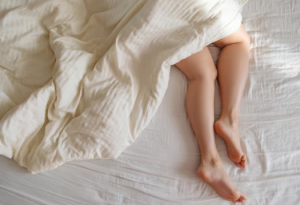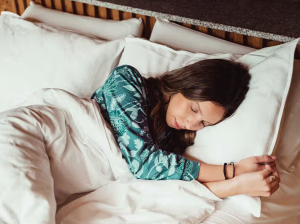Sticking one foot out of bed to sleep has a scientific explanation.

“The explanation for how it works is that in order to sleep, we have to expel internal heat to the outside through vasodilation,” says María José Martínez, coordinator of the Chronobiology group at the Spanish Sleep Society (SES).
For example, the human body functions like any other machine that, after a long day, overheats and, in order to rest, needs to “shut down” or “air out.”
Regarding this scientific process, Martínez explains to Cuidate Plus: “What we do is lower the internal temperature of our organs by dissipating heat outward through vasodilation. That is, the blood capillaries open, increasing our peripheral temperature in the skin, hands, and feet.”
It’s precisely when this vasodilation occurs that we tend to stick out one foot to expel that heat.
“We can observe this phenomenon very clearly in babies. When they’re sleepy, we see that their ears and nose are red and warm. What’s actually happening is that they’re vasodilating the peripheral areas to expel excess heat and be able to sleep,” the professional points out.
This is why this vasodilation, which regulates body temperature and allows us to rest, takes place in the peripheral areas of the body.
Tips for better sleep

Many factors can interfere with a good night’s sleep, from work stress and family responsibilities to illness. It’s no wonder quality sleep can sometimes be difficult to achieve.
Below are some habits that promote better sleep, according to the Mayo Clinic, a nonprofit organization dedicated to clinical practice, education, and research.
Follow a sleep schedule. The recommended amount of sleep for a healthy adult is at least seven hours. Most people don’t need more than eight hours to rest well.
Pay attention to what you eat and drink. Don’t go to bed hungry or overly full. In particular, avoid heavy or large meals a couple of hours before bedtime.
Create a restful environment. Ideally, a cool, dark, and quiet room is ideal. Exposure to light at night can make sleep more difficult. Avoid prolonged screen use before bed, and use blackout curtains, earplugs, or other devices to create a comfortable environment.
Limit daytime naps. Long naps during the day can interfere with nighttime sleep. If you have one, don’t let it last more than an hour and don’t let it be too late.
Get physical activity. Regular exercise can promote better sleep. However, as with meals, avoid activity too close to bedtime.
Manage worries. It may be very difficult, but you should try to resolve worries or concerns before bed. Or at least try to leave them outside the bedroom.

